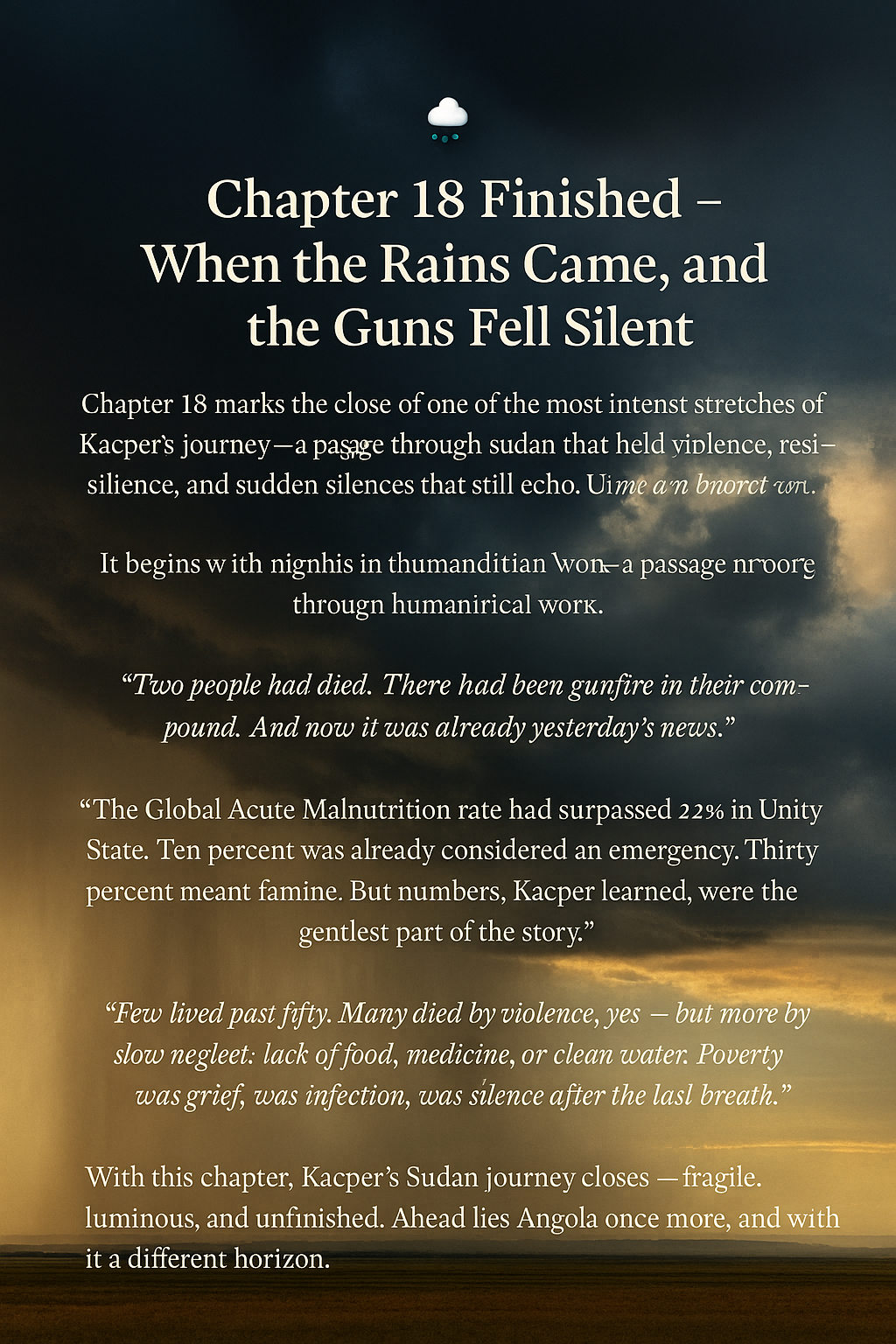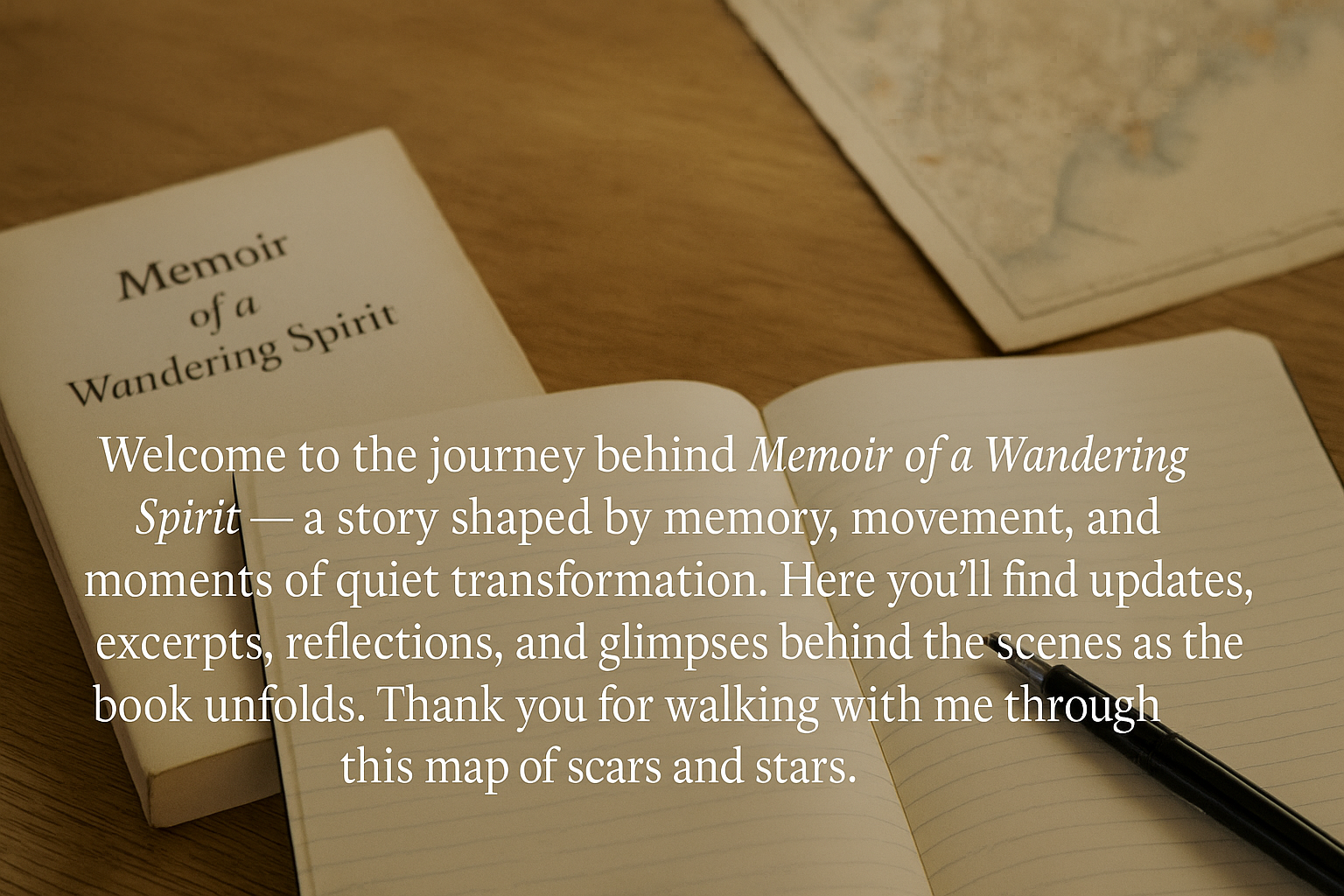Chapter 18 Finished — When the Rains Came, and the Guns Fell Silent

Chapter 18 marks the close of one of the most intense stretches of Kacper’s journey — a passage through Sudan that held violence, resilience, absurdity, and sudden silences that still echo.
It begins with nights in Rubkona and Bentiu, where gunfire tore through the darkness, only to be dismissed the next morning as “just two families fighting over cows.” In these contradictions — laughter beside loss, neighbourly protection alongside casual killing — Kacper discovered what it meant to live between terror and absurdity.
The chapter takes us deeper into the realities of humanitarian work: the conscription of two young Nuer nurses, Thiech and Gatluak, who vanished into warlord Paulino Matip’s militia overnight; the Therapeutic Feeding Centres in Wau and Unity State, where malnutrition rates reached famine levels; and the crushing weight of numbers that were never just statistics, but children’s bodies, parents’ impossible choices, and grief that became routine.
And yet, the rains did come. And, at least for a time, the guns did fall silent. Kacper’s time in Sudan closes with moments of surreal humanity — neighbours offering reassurances after bloodshed, colleagues sharing whispered jokes under mosquito nets, and his own return to Khartoum before reassignment to Angola.
Here are a few short excerpts to bring you closer to the texture of Chapter 18:
“The streets were nothing more than ruts of red dust, sometimes interrupted by puddles that reflected the sky like broken mirrors. Goats wandered freely, sometimes pausing to scratch against leaning wooden poles. Children ran barefoot, chasing tyres with sticks, laughing as if war had never passed this way. Women sat outside their tukuls weaving mats, grinding grain, or stirring pots balanced on three stones and fed with dry branches. The market buzzed quietly — stalls of sorghum, dried fish, worn-out clothes laid on tarps. Some women balanced impossible loads on their heads: plastic jerrycans, bundles of firewood, stacks of vegetables. Nuer-style homesteads stood in clusters — circular, low, with neat fences made of twisted branches. Smoke drifted lazily in the late light, from cooking fires or perhaps burning grass. It smelled of wood, ash, and something faintly sweet — a scent Kacper would come to associate with this place.”
“The Global Acute Malnutrition rate had surpassed 22% in Unity State. Ten percent was already considered an emergency. Thirty percent meant famine. But numbers, Kacper learned, were the gentlest part of the story.”
“Few lived past fifty. Many died by violence, yes — but more by slow neglect: lack of food, medicine, or clean water. Poverty was grief, was infection, was silence after the last breath.”
"That night, after the woman and her child had been admitted, Kacper and Lucy sat outside the compound, each with a mug of sweet karkadé in hand. The generator had been shut off early, so the silence was fuller than usual — punctuated only by the faint trill of night insects and the distant barking of dogs near the barracks.
Above them, the stars came in layers, thick and low, as if you could climb them if you dared.
Neither spoke for a long while.
Then Lucy broke the silence.
“Do you ever feel like we’re part of it?”
Kacper turned to her, not quite understanding.
“Part of what?”
“The theatre,” she said. “The coordination meetings. The clinics that aren’t clinics. The statements about humanitarian neutrality while everything burns around us.”
Kacper didn’t answer. He sipped the karkadé. Let it cool in his mouth.
Lucy continued, more softly now.
“I mean, we do what we can. But it’s like trying to keep the roof on a house that’s already on fire.”
He looked at her, this friend with whom he had shared so many battles, floods, impossible days. Her face was drawn, streaked with dust. Her blouse still carried the mark of the child she’d carried earlier — a faint outline of sweat and weakness. But her eyes were clear.
“We didn’t start the fire,” he said.
She smiled faintly.
“No. But we live in the smoke.”
They sat like that for a while — two foreign souls under a borrowed sky, neither defeated nor triumphant. Just tired. And still there."
With this chapter, Kacper’s Sudan journey closes — fragile, luminous, and unfinished. Ahead lies Angola once more, and with it a different horizon.

